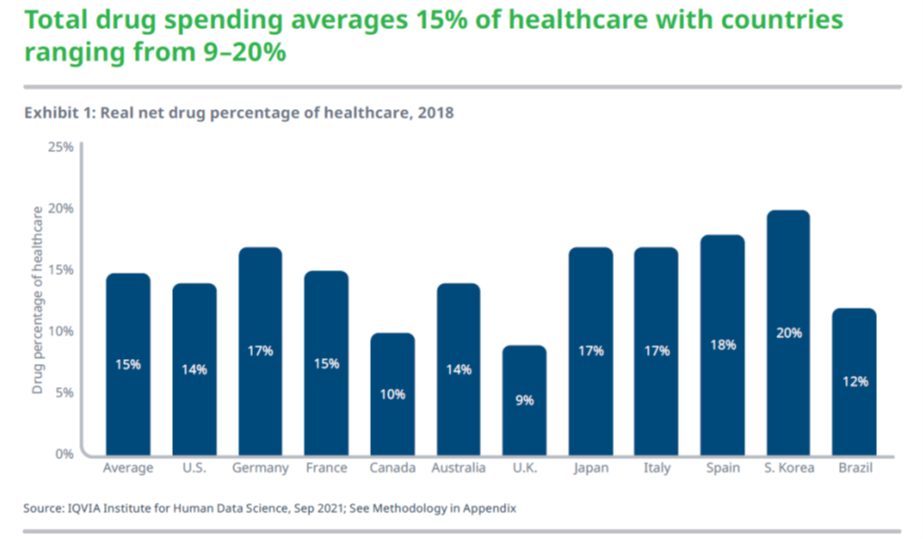In a typical rant, Senator Sanders claimed in a September 15th press release that “at a time when the drug companies are charging us by far the highest prices in the world, Congress must demand that Medicare negotiate prices with this extremely greedy and powerful industry.”
The Senator clearly misunderstands the problems plaguing the U.S. healthcare system. Innovative companies are not behind the healthcare unaffordability problems in the U.S. – too much government interference is.
Start with the Senator’s accusation about drug prices. If drug prices were driving the healthcare affordability problem, then the U.S. should be devoting a significantly higher share of its healthcare expenditures on drugs. But this is not the case.
An October 2021 report from IQVIA (one of the primary global data sources on the life sciences industry) compares the total amount of drug spending as a share of total healthcare spending across advanced economies that includes Germany, France, Canada, and the U.K. Exhibit 1 from this publication is reproduced below.

What would presumably shock Senator Sanders is that drug expenditures as a share of total healthcare expenditures are below average in the U.S. Overall, the U.S. devotes 14 percent of healthcare expenditures toward drugs compared to 15 percent on average for the industrialized economies. Germany, France, and Japan all devote more of their healthcare resources on drugs than the U.S.
Senator Sanders might correctly respond, “but the U.S. spends more on healthcare overall than these other countries”. But that is the point. Most of these countries use single payer systems that impose price controls and access restrictions to lower spending. Such policies also reduce health outcomes.
The U.S. does not impose price controls, but we would if Senator Sanders plan to allow Medicare to “negotiate prices” were implemented. Since these comparator countries have drug price controls but the U.S. does not, Americans have access to nearly 90 percent of all the medicines developed over the past decade compared to around 50 percent for this same group of countries.
Recognizing that, as a share of total healthcare spending, the U.S. devotes a smaller than average share toward drugs should change the focus of the healthcare debate. Instead of searching for corporate villains who make good political fodder, Congress should be addressing the flaws of the current third-party payer system.
These flaws are behind the out of control increases in total healthcare spending while simultaneously reducing overall healthcare quality. Addressing the flaws of the third-party payer system require policies that empower patients and providers, not policies that adopt the single payer system that is harming patients across Europe, Canada, and Japan.
Good policy starts with an accurate understanding of the problem. Senator Sanders belief that spending on drugs is driving the U.S. healthcare affordability problem fails this test. It should not be surprising that his suggested policies will make things worse rather than better.
Wayne Winegarden is director of the Center for Medical Economics and Innovation at the Pacific Research Institute and PRI senior fellow in business and economics.

